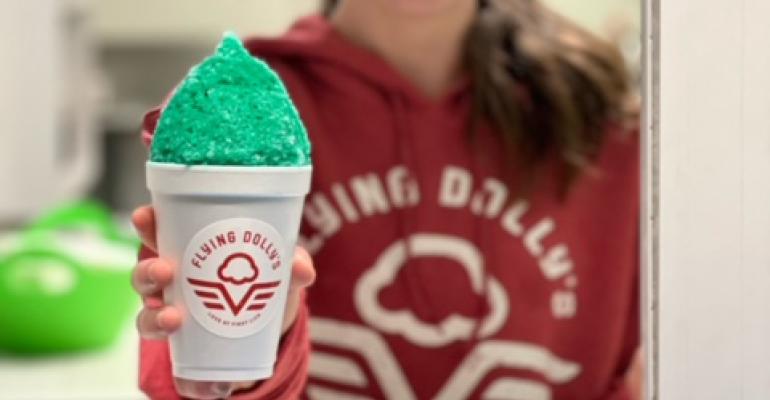When Flying Dolly’s first opened over 10 years ago in Mandeville, La., it was called Just Chillin and was known for its New Orleans-style snoballs. In 2023, the brand changed its name to begin expanding beyond its single unit.
The reason for the name change was all due to Nick Binnings, a longtime restaurant executive who previously worked with Another Broken Egg and Moe’s Southwest Grill. After noticing his kids were spending a lot of money at the treat shop Just Chillin, he went in to investigate it — and discovered that two of his high school classmates, Jeff and Corey Robertson, were the owners and operators of the concept.
Binnings wanted in. After talking to the Robertsons, he bought in on Just Chillin, certain he could help grow the brand across the Southeast.
Binnings looked at the concept through his franchising eyes and decided a few things: First, the name had to change. It was too hard to find a website and trademark for Just Chillin, so the brand was rechristened Flying Dolly’s — named for a one-eyed pug, Dolly, who used to jump into suitcases when her family was packing for a trip.
The second thing Binnings decided was to expand in a different manner than he had in the past with Moe’s Southwest Cantina and Another Broken Egg.
“We looked at our operations, we looked at our marketing, we looked at our development, and then finally we looked at our exit strategy,” Binnings said. “Operations, branding, marketing development — it's all self-explanatory. But the biggest thing that a young company has to decide is what are you going to do with your company? Is this something that you just want to grow it and turn it over to the more experienced people, whether it's just a more experienced entrepreneur or private equity? Or do you want to turn this into a legacy brand?”
For Flying Dolly’s, the decision was to go the latter route. Binnings and the Robertsons want it to be a family business.
“We look at this as something [where] we're going to build a fun family,” Binnings said. “This is something for the long haul. This isn't, ‘Hey, we're going to build this up in five years and sell.’ At least that's not our game plan.”
One of the Robertson sons is already involved in working at Flying Dolly’s, and Binnings’ son starts this week.
What Binnings thinks separates Flying Dolly’s from other brands is the passion from the owners. That, he thinks, will not only attract franchisees but also help the brand maintain its image as a family-friendly place to be.
“Jeff and Corey [Robertson] are truly that entrepreneur, that they just live and breathe their brand and their company,” he said.
While franchising efforts have only just begun, there are already deals signed for two units in Brandon and Flowood, Miss., set to open in March. That’s on top of two new corporate stores in New Orleans and Baton Rouge, La., that are slated for a March opening as well, pending lease agreements.
Binnings thinks the concept has legs because of the economic environment. He thinks snack and treat brands are poised to succeed in this period of high inflation and consumer interest in value.
“I personally think people are always going to have a few dollars … for their coffee, whether they want to go to a bar, or whether they want to go get ice cream and a snoball or something sweet,” he said.
His hypothesis is backed up by recent data that shows the snack/treat segment is embedded in consumer lifestyles. According to America’s Favorite Chains, published by NRN in partnership with Technomic, Smoothie King was the No. 10 chain on the list while Tropical Smoothie Café was No. 8 and Dutch Bros was No. 3.
The midday snack segment has grown so much that even McDonald’s jumped into the category with CosMc’s, its recently debuted specialty beverage brand.
Another thing working in Flying Dolly’s favor is the cost of entry. The average cost to open a location is $150,000–$350,000 and the footprint is 1,000-2,000 square feet.
Binnings said the company is looking for mostly second-generation real estate because the retrofitting and renovating costs are so much lower.
The brand also uses minimal equipment, so it won’t set franchisees back in terms of finances. There is an option to make their own ice cream at the store, which would be approximately $80,000 extra. Flying Dolly’s also has a distribution center outside New Orleans where the ice cream is made for mass production.
The ideal Flying Dolly’s franchisee, according to Binnings, is passionate about owning a small business. He’s looking for mom-and-pop type owners who want to take full responsibility for a business and make money.
Each franchisee should be opening the unit in an area where they live. Flying Dolly’s isn’t looking for multi-unit operators.
“We want somebody who's truly going to be in their business and their market,” he said. “We want you to be part of the community, we want you to run your own Facebook page. This is your baby; we're here to support you, but make it yours.”
Binnings knows that it won’t be all sunshine and roses.
“I know we're going to have problems, and I know I'm going to have to rein in franchisees, but if we grow it the right way, and you're upfront with the franchisee in the beginning, and you stay upfront with them and you slowly stay on the backside of it, I think you can control it,” he said.





